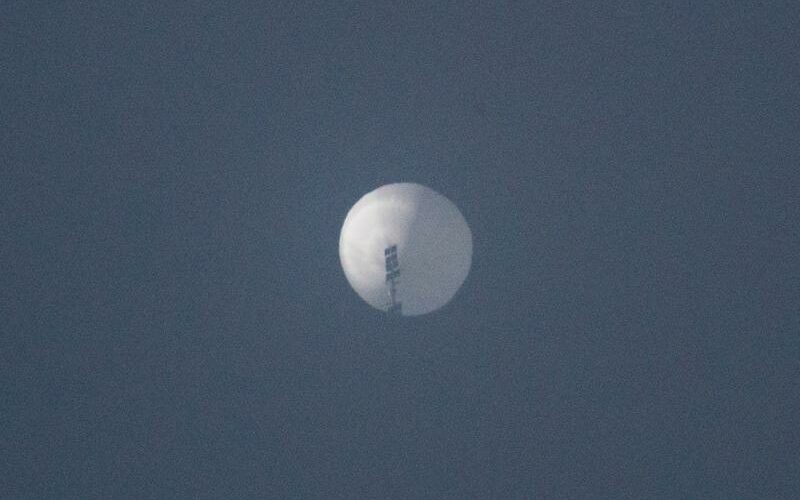Blinken postpones China trip over 'unacceptable' Chinese spy balloon
WASHINGTON/BEIJING (Reuters) -U.S. Secretary of State Antony Blinken postponed a visit to China that had been expected to start on Friday after a Chinese spy balloon was tracked flying across the United States in what U.S. officials called a “clear violation” of U.S. sovereignty.
The Pentagon said on Thursday it was tracking a high-altitude surveillance balloon over the continental United States. Officials said military leaders considered shooting it down over Montana on Wednesday but eventually recommended against this to President Joe Biden because of the safety risk from debris.
On Friday, Pentagon spokesman Brigadier General Patrick Ryder said the balloon had changed course and was now floating eastward at about 60,000 feet (18,300 meters) above the central part of country. He said it would likely be over the United States for a few more days.
The incident sparked a political furor in the United States, and China on Friday expressed regret that a “civilian” airship had strayed into U.S. airspace after being blown off course.
A senior State Department official told reporters Blinken had nevertheless decided to postpone his trip.
“We have noted the PRC (People’s Republic of China) statement of regret, but the presence of this balloon in our airspace is a clear violation of our sovereignty as well as international law, and it is unacceptable that this has occurred,” the official said.
The official added that Blinken had indicated to Wang Yi, director of China’s Central Commission for Foreign Affairs, “that he would plan to travel to the PRC at the earliest opportunity when conditions allow.”
ABC News cited an U.S. official as saying Blinken did not want to blow the situation out of proportion by canceling his visit, but also did not want the balloon incident to dominate his meetings with Chinese officials.
Republican Senator Tom Cotton had called for Blinken to cancel his trip, while Republican former President Donald Trump, a declared presidential candidate for 2024, posted “SHOOT DOWN THE BALLOON!” on his Truth Social media platform.
LOST OPPORTUNITY?
Postponement of Blinken’s trip, which was agreed to in November by Biden and Chinese President Xi Jinping, is a blow to those on both sides who saw it as an overdue opportunity to stabilize an increasingly fractious relationship. The last visit by a U.S. secretary of state was in 2017.
Biden ignored questions about the balloon when giving remarks on the economy Friday morning.
China is keen for a stable U.S. relationship so it can focus on its economy, battered by the now-abandoned zero-COVID policy and neglected by foreign investors alarmed by what they see as a return of state intervention in the market.
In recent months Xi has met with world leaders, seeking to re-establish ties and settle disagreements.
Daniel Russel, the top U.S. diplomat for Asia under then-President Barack Obama, said he did not see a strategic rationale for canceling the trip and stressed the importance of maintaining high-level engagement with China.
“In as much as the U.S. has much bigger fish to fry with the Chinese than a surveillance balloon, the Biden team may be inclined to pick up where they left off after a decent interval,” Russel said. Sino-U.S. relations have soured significantly in recent years, particularly following then-U.S. House Speaker Nancy Pelosi’s visit to Taiwan in August, which prompted dramatic Chinese military drills near the self-ruled island.
LIMITED INTELLIGENCE VALUE
Ryder told reporters on Thursday the balloon was at an altitude well above commercial air traffic and did not present a military or physical threat to people on the ground. One U.S. official added that the balloon was assessed to have “limited additive value from an intelligence collection perspective.”
Another official said the flight path would carry the balloon over a number of sensitive sites, but did not give details. Malmstrom Air Force Base in Montana is home to 150 intercontinental ballistic missile silos.
Ryder declined on Friday to specify where precisely the balloon was.
On Wednesday, the Billings, Montana, airport issued a ground stop as the military mobilized assets including F-22 fighter jets in case Biden ordered that the balloon be shot down.
Such balloons typically operate at 80,000-120,000 feet (24,000-37,000 meters), well above where commercial air traffic flies. The highest-performing fighter aircraft typically do not operate above 65,000 feet, although spy planes such as the U-2 have a service ceiling of 80,000 feet or more.
China has often complained about surveillance by the United States, including its deployment of ships or planes near Chinese military exercises.
The United States also uses military spy satellites to monitor China’s military buildup, but Taylor Fravel, an expert on China’s military at the Massachusetts Institute of Technology, said he was not aware of any Chinese allegations that U.S. surveillance flights have violated Chinese airspace in recent years.
Source: Read Full Article

